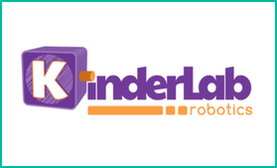
The cards can be used independently by students in a classroom activity station, as the basis for teacher-guided lessons in remote learning, or when playing and learning with KIBO at home.
The KIBO Activity Cards provide a sequenced introduction to each robotic part and programming concept. Each card features an “educator side” with clearly outlined learning goals, and a “child side” which includes large pictures and simple instructions to guide students through building their KIBO. The activities walk a student through how to transform their KIBO through art and create code to bring the robot to life.
With the KIBO Activity Cards, students engage in fun STEAM projects such as:
- Designing and building a “KIBO firetruck” and programming it to drive around a cardboard town;
- Decorating a “KIBO sunflower” that responds to light with actions the students design; and
- Creating a “KIBO rover” to navigate an imagined planet using its distance sensor.
Jason Innes, KinderLab Robotics’ Director of Curriculum, Training, and Product Management, said, “Our new KIBO Activity Cards perfectly support the advantages of STEAM robotics in early childhood, with tangible code and a physical robot to experiment with. The ‘magic’ of KIBO lies in children’s ability to tell stories using art, code, and engineering. These new cards guide children through coding and engineering concepts while leaving room for their own inspiration, imagination, and play. The cards also give teachers and parents an easy-to-use resource for independent student work, which is critical both in the classroom and when using KIBO in remote or home-based learning.”
These activity cards are designed for use in a wide range of educational settings:
Classroom Stations: The cards support a semi-independent station or activity center (aka “KIBO Corner”). The cards’ “educator side” offers a project scope and learning goals, while the “child side” offers simple instructions for semi-independent use.
Homeschool or at-Home Blended Learning: These child-led activities can be used at home under the guidance of a caregiver or an educator remotely, where the cards provide a structure to instruct the young learners on their project-based work.
Parent-Child Activities at Home: At home, the child can choose a project, and the parent—supported by the overview and suggestions on the “educator side”—can join in the fun, helping as needed.
The new KIBO Activity Cards are available now for $26 on the KinderLab Robotics web store. The Activity Cards are also included in KIBO’s Classroom Packages, the Blended Learning Curriculum Bundle, and the three-month KIBO Home Robotics Course.
About KIBO – The Playful STEAM Robot
KIBO is a robot kit that allows children aged 4–7 to build, program, decorate, and bring their own robot to life without requiring any screen time on a smartphone, tablet, or computer. It is an open platform on which students can envision and create their own robot. With art and engineering, students transform KIBO into imagined animals, vehicles, storybook characters, and more. Students plan a coding sequence using wooden programming blocks, then scan their sequence with the built-in barcode scanner, press its button—and the robot comes alive.
When children build, code, and decorate their own robot, they perceive it as play, but they are learning invaluable STEAM skills. Not only are these hands-on experiences inherently rewarding, but they help children understand the technology in their world and can even improve their future job prospects.
About KinderLab Robotics
KinderLab Robotics is the creator of the award-winning KIBO, a playful educational STEAM robot kit based on 20 years of child development research with thousands of children, teachers, and parents. Developed specifically for teachers by Dr. Marina Umaschi Bers at Tufts University, KIBO is currently used in 59 countries and has proven efficacy in helping kids learn STEAM—and getting them excited about it! KinderLab offers a complete suite of teaching materials that help integrate STEAM elements into a wide range of curricula, including art, cultural studies, and reading literacy.
For more information, please visit KinderLabRobotics.com.












